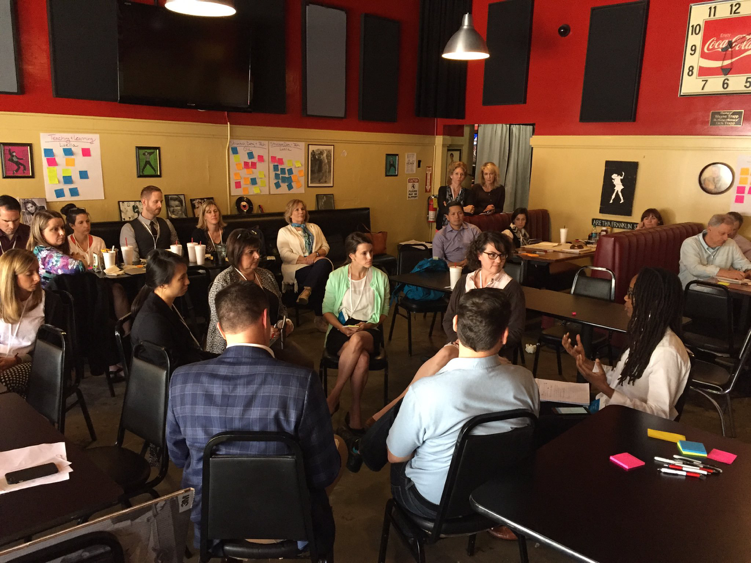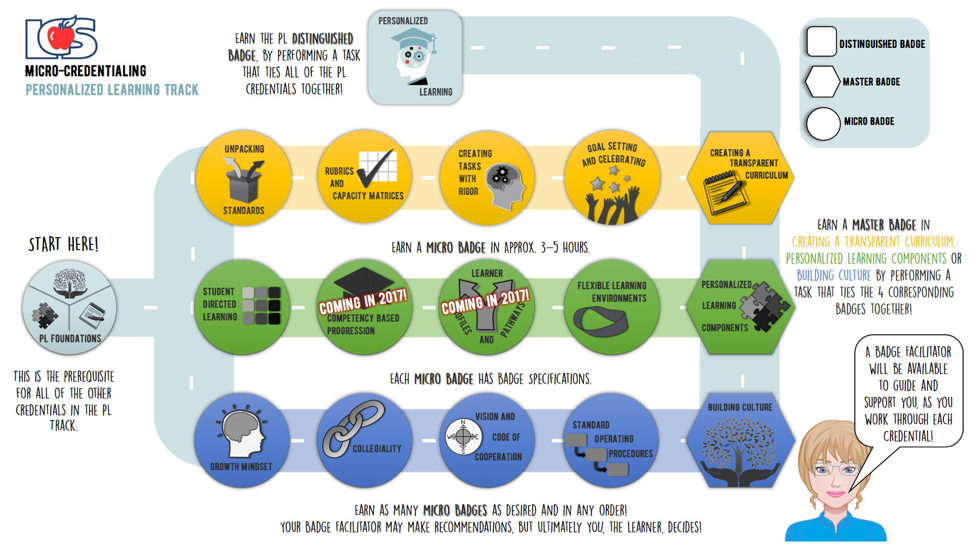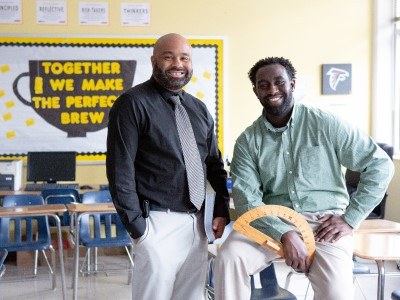Building Community
Scaling Personalized Learning: Questions of Equity and the Role of Micro-Credentials
Topics

When educators design and create new schools, and live next gen learning themselves, they take the lead in growing next gen learning across the nation. Other educators don’t simply follow and adopt; next gen learning depends on personal and community agency—the will to own the change, fueled by the desire to learn from and with others. Networks and policy play important roles in enabling grassroots approaches to change.
Practitioner's Guide to Next Gen Learning
Scaling personalized learning to benefit more students in more schools doesn’t happen by adopting a school model like a recipe. Personalized learning often scales best by invitation.
In today’s Friday Focus: Practitioner’s Guide to Personalized Learning, you will:
- Consider the role of an equity lens in personalized learning
- Sneak-a-peek at Lake County’s new micro-credential offerings for teachers
One of the persistent challenges of the shift to personalized learning is extending its reach—first to more students and teachers in classrooms, then to more schools, districts, and supporting partners. The work is complicated because it happens on so many levels. Teacher and leader professional capacity and mindset are initially the priorities because they are needed to support reimagined school designs—especially those that are “equitable by design.” Capacity and mindset building nurtures a school culture and instructional practices as well as change management, operational decisions, systems alignment, and policy flexibility.
Scaling personalized learning to benefit more students in more schools doesn’t happen by adopting a school model like a recipe. It happens socially through relationships that foster dialogue and expanded possibility; connections that co-create vision; and, a collective commitment to serve student and community needs differently and better than ever before. These changes are choices, so personalized learning often scales best by invitation and, as suggested here, virally by affiliation.
This spring, 13 sites deeply engaged in personalized learning met to share their experience and expertise. Six sites represented traditional districts (participants in the Next Generation Systems Initiative) while the other seven represented ecosystem hubs (partners in the NGLC Regional Funds for Breakthrough Schools). Both networks have been working for three years with the generous funding of the Bill & Melinda Gates Foundation to realize a local vision of personalized, next gen learning with the potential for broad and meaningful impact. That’s where capacity building for scale enters the scene. These sites share a passion for the promise of personalized learning and, specifically, equity. Collectively, because of their different approaches, mis-steps and pioneering wins—they’re a brain trust of lessons learned and implementation wisdom.
Throughout the year, we’ll be highlighting the contributions of these 13 sites in the form of tools, resources, and collective wisdom. Members of both networks have known about each other, but only met formally for the first time this spring. Why now? Because each site now has a story to tell. Tangible products to show for their work, and an emerging set of practices with which to inspire and guide colleagues who are curious, but maybe not yet fully engaged beyond their own classroom efforts.
In a recent Friday Focus edition, you got a flavor of the school visits that took place in Henry County School District, the host site for this convening of NGSI and Regional Fund sites. In this edition, I introduce you to a key issue—equity—and a top resource—micro-credentials—emerging from their collective work. Both topics were part of the convening agenda, which was designed to support reflection on the group’s individual practices and common areas of inquiry.
Developing an Equity Lens for Personalization
Equity is the driving passion for many educators. It’s true of the leaders in the 13 sites as well, and what’s significant is that they embrace an opportunity in personalized learning to intentionally design for equity. They’re also practicing equity with colleagues in their network by intentionally working to establish a supporting and nurturing culture for equity. That means constructive listening, open and honest dialogue, reflection on practice, and greater self-awareness about positional authority, privilege, implicit bias, and systemic oppression.
It’s misleading to make equity work sound this straight-forward when in reality it can be emotionally messy. No matter your individual passion for the issues, answering pointed questions about race, bias, and identity in front of your peers is probably an uncomfortable thought. Good facilitation makes all the difference; and thankfully, this network is blessed with a truly gifted one in Caroline Hill. She’s a nationally recognized equity expert and currently serves as Chief of School Creation and Transformation for CityBridge Education, the NGLC Regional Fund partner in Washington, D.C.

At the convening, Caroline led participants through a fishbowl session that helped them examine what equity means to them and how educators can intentionally make equity part of their personalized learning efforts. The session served as an on-ramp to the opportunity to explore and use NGLC’s Equity Toolkit to bolster ongoing professional learning and to assist in developing the equity lens of these leadership teams.
“It was a really eye-opening session…it brought home the idea that we need listen to people about what they need rather than assume we know what they need to provide an equitable space and environment,” said Kristian Sorensen, program manager of custom schools at Riverside Unified School District in California, an NGSI district.
The core of the fishbowl activity facilitated reflection and discussion on the importance of equity in a student-centered learning environment. Because personalized learning environments make it easier to meet students where they are in their learning, examining how educators are approaching the model is essential. The activity helped the group think about implicit biases they hold, as well as those that are in their school or community. Participants began to see how thinking openly and honestly about structures of inequity that exist in students’ lives can help prevent personalized learning efforts from becoming a new way of putting students into defined tracks.
Ramona Treviño, senior director, district and school design at the Regional Fund partner Center for Collaborative Education, said the “inspiring” session opened her eyes to how inequities do not have to be overt to become barriers for students, that even small subtle racism can stand in the way.
Micro-credentialing: Personalizing Professional Development for Educators
In another session, the team from NGSI district Lake County Schools shared their personalized learning approach to professional development to train and support teachers as the district shifts to personalized learning for students. Lake County shared details about their micro-credentialing program and its impact on giving educators agency in their learning. Micro-credentials are a way of certifying and demonstrating competence of specific skills or concepts. They’re attractive because they’re competency-based. They can be flexibly accessed online and thus enable anytime, anywhere learning. Watch this video if you need a one minute primer on how micro-credentials work.

Lake County’s program invites interested educators to explore different competencies in order to develop their personalized learning expertise. Educators earn “bite size” credentials in components like growth mindset, creating tasks with rigor, or flexible learning environments. Mastering each of these components demonstrates value; mastering the set or series indicates a deeper and more comprehensive understanding. Just as personalized learning helps students master the skills they need, it can be a great way to help teachers build needed skills. Never has this been more true or urgently needed, especially as schools and districts take on innovative approaches that may not be taught in traditional teacher ed programs.
“It used to be that you were told what kind of training you needed, how many points you need to get, when it was, where it was. The assumption generally was everyone wanted to stay after school in a media center for three or four hours and learn from someone lecturing you…but that’s the old way of doing things,” said Dennis Russo, personalized learning coordinator at Pinellas County Schools in Florida, another NGSI district. Educators, just like students, learn better when they are engaged in their learning—not passive listeners. Plus, for Russo micro-credentialing offers a way to share leadership roles on a larger scale. “With micro-credentialing if you learn these little pieces of this big puzzle, you become a leader faster and with a specialized focus,” he said.
You can view Lake County's presentation about their home-grown platform course. After experiencing it this spring, several network members expressed their intent to use or adapt it to build local professional capacity. The idea had wide appeal for those sites thinking about how to scale the mindsets that existed in a handful of schools to many more educators district-wide. The micro-credential infrastructure held appeal because it models important enabling conditions like choice and learner agency for adult learners, and because it can sit inside existing professional advancement structures. With or without additional incentives, the adaptability of a micro-credentialing approach enables a degree of acceleration and scale. Digital Promise also offers micro-credentials on personalized learning designed in partnership with the Institute for Personalized Learning. These resources can be used in the same ways to support greater professional reach and scale in districts and large ecosystems.
The team and I would like to extend special thanks to Kavitha Thimmaiah of Communications Strategy Group for her help in putting together this edition.




